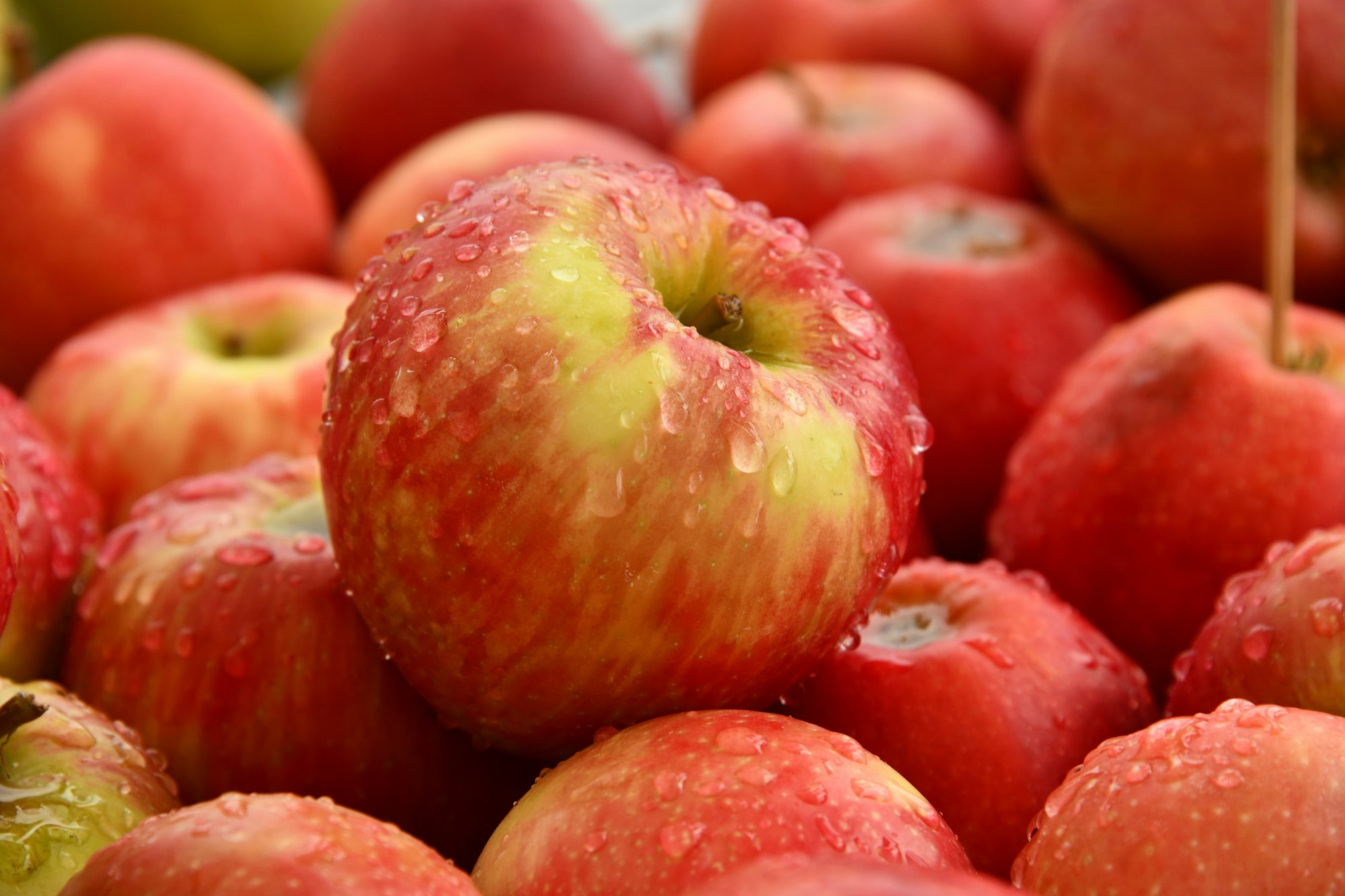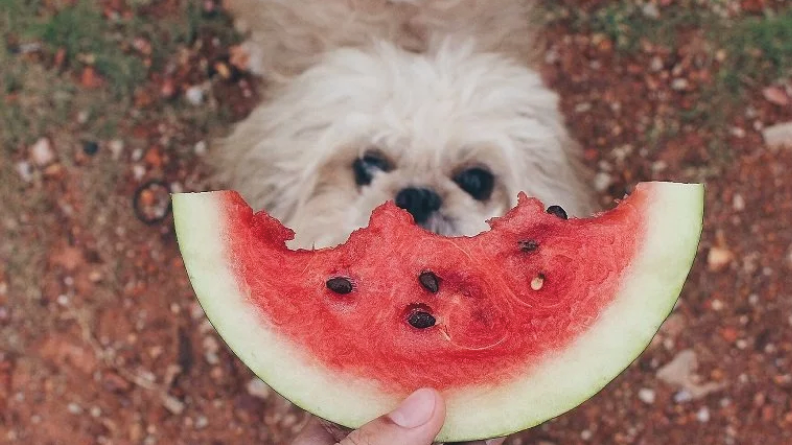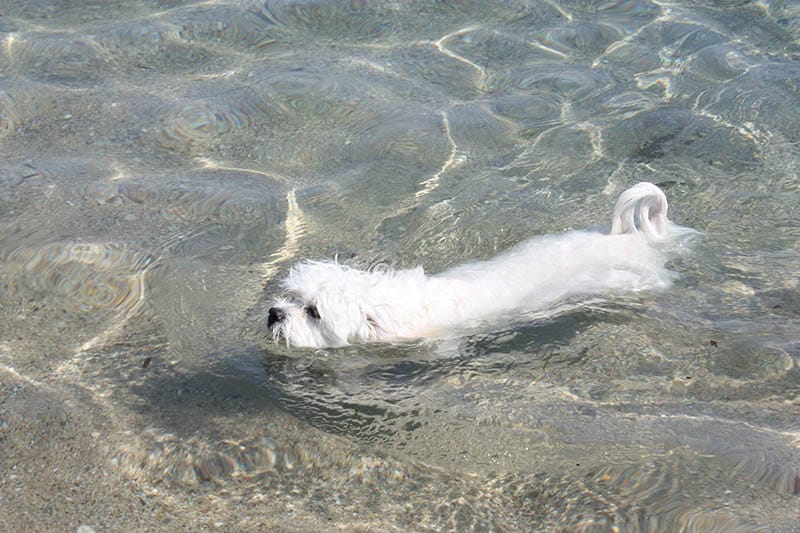Are you wondering if your adorable Maltese pup can safely snack on juicy apples? Well, you've come to the right place! In this article, we will explore whether or not it's safe for Maltese dogs to indulge in this popular and nutritious fruit. Apples are a common pantry staple for many of us, so it's only natural to consider sharing a slice with our furry friends. But before you do, it's important to know the facts to ensure your pet's health and safety.

We'll discuss the potential benefits, any potential risks, and offer helpful tips on how to properly introduce apples into your Maltese's diet. Whether you're looking to provide a tasty and healthy treat or simply curious about canine nutrition, keep reading to find out if your Maltese can munch on apples without any worries.
Health Benefits of Apples for Maltese Dogs
Apples are not only delicious but also packed with nutrients that can benefit your Maltese dog's overall health. They are a great source of vitamins A and C, as well as dietary fiber. Vitamin A is essential for promoting good vision and a healthy immune system, while vitamin C acts as an antioxidant, protecting the body's cells from damage. The fiber content in apples can aid in digestion and help regulate your Maltese's bowel movements. Additionally, apples contain phytochemicals, such as flavonoids, which have been shown to have anti-inflammatory and antioxidant properties.
Despite their small size, Maltese dogs have specific nutritional requirements that must be met to ensure optimal health. Apples can be a healthy addition to their diet when given in moderation. However, it's important to keep in mind that apples should not replace a balanced diet specifically formulated for dogs. They should be considered as a treat or supplement to their regular meals.

Nutritional Value of Apples for Maltese Dogs
Apples are low in calories and fat, making them an excellent choice for Maltese dogs who may be prone to weight gain. A medium-sized apple contains approximately 95 calories and less than half a gram of fat. The high fiber content of apples can also help your Maltese feel fuller for longer, which can be beneficial for weight management. Additionally, apples are a good source of hydration, as they contain a high percentage of water.
The natural sugars found in apples may raise concerns for some pet owners. However, the sugar content in apples is relatively low compared to other fruits, and the fiber content can help regulate blood sugar levels. It's important to note that while apples are generally safe for Maltese dogs, they should be fed in moderation to prevent any potential digestive issues.
Precautions When Feeding Apples to Maltese Dogs
While apples are generally safe for Maltese dogs, there are a few precautions to keep in mind. First, always remember to remove the apple seeds and core before feeding them to your pup. Apple seeds contain trace amounts of cyanide, which can be toxic to dogs if consumed in large quantities. While a few seeds accidentally ingested are unlikely to cause harm, it's best to err on the side of caution and remove them altogether.
It's also important to introduce apples gradually into your Maltese's diet. Start by offering small, thinly sliced pieces of apple and monitor your dog's reaction. Some dogs may have a sensitive stomach or be prone to allergies, so it's important to watch for any signs of discomfort or digestive issues. If your Maltese shows any adverse reactions, such as vomiting, diarrhea, or excessive gas, discontinue feeding them apples and consult with your veterinarian.
How to Prepare Apples for Maltese Dogs
Before offering apples to your Maltese dog, it's crucial to prepare them in a safe and suitable manner. Wash the apple thoroughly to remove any dirt or pesticides, then peel the skin to make it easier for your dog to digest. Cut the apple into small, bite-sized pieces, ensuring there are no seeds or core included. Remember, moderation is key when it comes to feeding apples to your Maltese, so start with a small amount and observe how your dog responds.
To make the apples more enjoyable for your Maltese, you can try freezing them. Frozen apple slices can serve as a refreshing and satisfying treat, especially during hot weather. However, always supervise your dog when giving them frozen treats to prevent any potential choking hazards. It's also important to remember that while apples can provide a healthy snack, they should never replace your Maltese's main diet, which should consist of nutritionally balanced dog food.
Other Fruits and Vegetables Safe for Maltese Dogs

If you're looking to diversify your Maltese's diet with other fruits and vegetables, there are several safe options to consider. Blueberries, strawberries, and watermelon are all safe and healthy choices for your furry friend. These fruits are packed with antioxidants and vitamins that can contribute to your Maltese's overall well-being. However, it's important to note that not all fruits and vegetables are safe for dogs. Avoid feeding your Maltese grapes, raisins, onions, garlic, and avocados, as these can be toxic to dogs.
When introducing new fruits or vegetables into your Maltese's diet, always start with small amounts and observe their reaction. Some dogs may have specific sensitivities or allergies, so it's important to monitor for any adverse effects. If you're unsure about a particular fruit or vegetable, consult with your veterinarian to ensure your Maltese's safety.
Signs of Apple Allergies in Maltese Dogs
It's essential to be aware of potential allergic reactions when introducing new foods like apples to your Maltese dog. While apples are generally safe, individual dogs may have sensitivities. Here are some signs of apple allergies to watch for:
Itching and Scratching:
Persistent itching or scratching, especially around the face, ears, or paws, may indicate an allergic reaction. If you notice your Maltese exhibiting discomfort through excessive scratching, it's worth investigating further.
Digestive Upset:
Changes in bowel movements, diarrhea, or vomiting could be signs of an adverse reaction to apples. Monitor your dog's digestive health when introducing apples into their diet.
Swelling or Redness:
Swelling or redness around the mouth, eyes, or other parts of the body may be indicative of an allergic response. This can manifest as inflammation and should be addressed promptly.
Lethargy or Unusual Behavior:
If your Maltese displays unusual behavior, lethargy, or a lack of interest in activities they usually enjoy after consuming apples, it could be a sign of an allergic reaction affecting their overall well-being.
Ear Infections:
Allergic reactions may contribute to ear infections in some dogs. Keep an eye on your Maltese's ears for signs of redness, swelling, or an increase in earwax production.
Gastrointestinal Distress:
Signs of gastrointestinal distress may include excessive gas, bloating, or discomfort. Monitor your Maltese for any signs of abdominal discomfort after consuming apples.
Respiratory Issues:
In severe cases, allergic reactions can affect the respiratory system. If you observe coughing, wheezing, or difficulty breathing, seek immediate veterinary attention.
If you notice any of these signs after giving your Maltese apples, it's crucial to discontinue the treat and consult with your veterinarian. They can provide guidance on whether the symptoms are indeed related to apple allergies and recommend suitable alternatives for your dog's diet. Always prioritize your Maltese's health and well-being when introducing new foods.
Tips for Introducing Apples to a Maltese Dog's Diet
When introducing any new dog food to your Maltese's diet, it's important to do so gradually and with caution. Start by offering a small amount of thinly sliced apple as a treat. Observe your dog's reaction and monitor for any signs of digestive upset or allergies. If your Maltese tolerates the apples well, you can gradually increase the amount given. However, always remember to keep the portions small and incorporate apples as an occasional treat rather than a staple in their diet.
As with any treat or addition to your Maltese's diet, it's important to maintain a proper balance. Apples should be given in moderation and should never replace a nutritionally balanced dog food. If you have any concerns or questions about your Maltese's diet, consult with your veterinarian for personalized advice.
Apple Recipes for Maltese Dogs
If you're looking to get creative with apples and treat your Maltese to something special, here are a couple of simple and healthy recipes to try:
- Apple and Peanut Butter Bites: Slice an apple into small pieces and spread a thin layer of natural, unsalted peanut butter on each slice. This tasty and nutritious apple treat is sure to delight your Maltese.
- Frozen Apple Yogurt: Mix plain, unsweetened yogurt with small apple chunks and freeze in an ice cube tray. This frozen treat is perfect for hot summer days and provides a refreshing snack for your Maltese.
Remember to adjust the portion sizes based on your Maltese's size and dietary needs.
Facts About Maltese and Apples
Maltese dogs, known for their charming personalities and luxurious white coats, can indeed enjoy apples as a tasty and nutritious treat. Here are some facts about the relationship between Maltese dogs and apples:
Safe and Nutritious Treat:
Apples are generally safe for Maltese dogs when prepared and served appropriately. They provide a healthy option for a canine-friendly snack.
Rich in Nutrients:
Apples are rich in essential nutrients, including dietary fiber, vitamin C, and antioxidants. These elements contribute to overall well-being and can complement a Maltese's diet.
Moderation is Key:
While apples offer nutritional benefits, moderation is crucial. Too many apples can lead to digestive issues due to their natural sugar content. Treats should be a small part of a balanced diet.

Remove Seeds and Core:
To ensure safety, always remove the seeds and core of the apple before offering it to your Maltese. These parts can contain substances that may be harmful to dogs.
Variety of Treat Options:
Apples can be presented to Maltese dogs in various forms, such as sliced, diced, or even frozen as a refreshing summer treat. Experiment with different preparations to find what your dog enjoys.
Monitor for Allergic Reactions:
While allergies are rare, it's essential to monitor your Maltese for any signs of discomfort or adverse reactions after consuming apples. This includes itching, vomiting, or changes in behavior.
Dental Benefits:
Chewing on apple slices can contribute to dental health by helping to remove plaque and freshen breath. It's a natural way to support your Maltese's oral hygiene.
Consult with Your Veterinarian:
Before introducing apples or any new treat into your Maltese's diet, consult with your veterinarian. They can provide personalized advice based on your dog's specific health needs.
Preference Varies:
Just like humans, dogs have individual preferences. While some Maltese may eagerly enjoy apples, others may not be as fond of them. Respect your dog's taste preferences when offering treats.
Homemade Apple Treats:
Consider making homemade apple treats for your Maltese, ensuring they are free from harmful additives or preservatives. Simple recipes like frozen apple cubes or baked apple slices can be a hit.
By understanding these facts, you can make informed decisions about incorporating apples into your Maltese's diet. As with any treat, it's crucial to prioritize your dog's health and happiness, tailoring their diet to their individual needs and preferences.
Conclusion
In conclusion, apples can be a safe and healthy treat for Maltese dogs when fed in moderation. They offer several nutritional benefits, including vitamins, fiber, and hydration. However, it's important to remove the seeds and core before feeding them to your Maltese, as they can be toxic in large quantities. Introduce apples gradually and monitor for any signs of allergies or digestive issues. Always remember to maintain a balanced diet for your Maltese and consult with your veterinarian if you have any concerns or questions about their diet. With proper precautions and moderation, your Maltese can enjoy the occasional apple treat without any worries.

FAQs About Maltese Dogs and Apples
- Q1: Can Maltese dogs eat apple skin?
- Yes, Maltese dogs can eat apple skin, but it's recommended to remove the skin for easier digestion. Some dogs may have trouble digesting the skin, so it's best to observe your pet's reaction.
- Q2: How often can I give apples to my Maltese?
- Moderation is key when feeding apples to Maltese dogs. A few times a week is generally safe. Pay attention to your dog's overall diet and adjust the frequency accordingly.
- Q3: Are there any apples to avoid?
- While apples are generally safe, avoid giving your Maltese rotten or moldy apples. These can be harmful and may cause digestive issues. Always choose fresh, crisp apples.
- Q4: Can I share my apple snacks with my Maltese?
- It's okay to share apple snacks with your Maltese, but ensure that your snack doesn't contain harmful ingredients like seeds or artificial sweeteners. Stick to plain, sliced apples without any added toppings.
- Q5: What if my Maltese shows signs of dislike towards apples?
- Dogs, like humans, have individual preferences. If your Maltese shows signs of dislike towards apples, respect their preferences, and consider offering other dog-friendly treats. There are plenty of healthy alternatives to explore.
More Maltese Eating related articles:










